中国传统节日(中英文对照)
中国传统节日及传说中英文对照
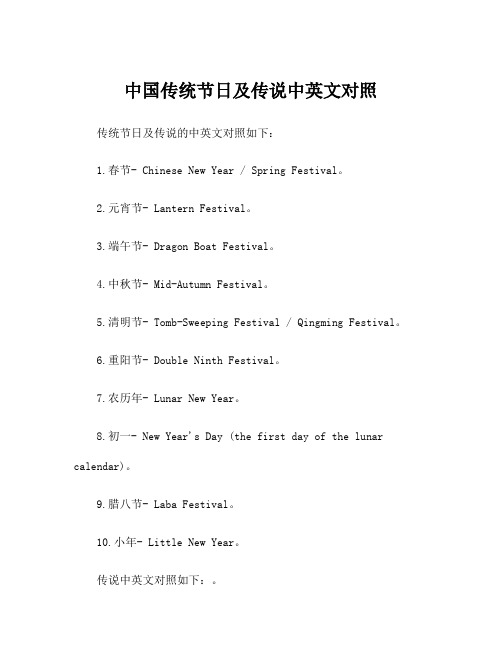
中国传统节日及传说中英文对照传统节日及传说的中英文对照如下:1.春节- Chinese New Year / Spring Festival。
2.元宵节- Lantern Festival。
3.端午节- Dragon Boat Festival。
4.中秋节- Mid-Autumn Festival。
5.清明节- Tomb-Sweeping Festival / Qingming Festival。
6.重阳节- Double Ninth Festival。
7.农历年- Lunar New Year。
8.初一- New Year's Day (the first day of the lunar calendar)。
9.腊八节- Laba Festival。
10.小年- Little New Year。
传说中英文对照如下:。
1.嫦娥奔月- Chang'e Flying to the Moon。
2.神话五岳- The Myth of the Five Sacred Mountains。
3.龙舟竞渡- The Legend of Dragon Boat Racing。
4.桃花源- The Peach Blossom Spring。
5.白蛇传- The Legend of White Snake。
6.八仙过海- The Eight Immortals Cross the Sea。
7.牛郎织女- The Cowherd and the Weaver Girl。
8.茶的传说- The Legend of Tea。
9.粽子的传说- The Legend of Zongzi。
10.红烧肉的传说- The Legend of Braised Pork Belly。
中国各传统节日的英语表达方式
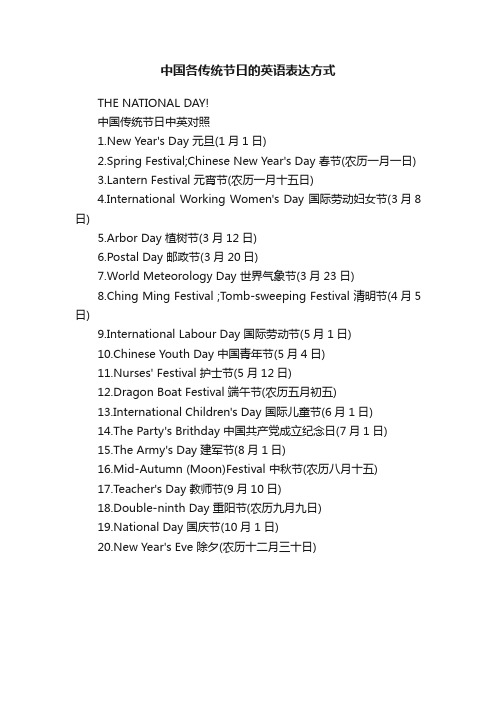
中国各传统节日的英语表达方式THE NATIONAL DAY!中国传统节日中英对照1.New Year's Day 元旦(1月1日)2.Spring Festival;Chinese New Year's Day 春节(农历一月一日)ntern Festival 元宵节(农历一月十五日)4.International Working Women's Day 国际劳动妇女节(3月8日)5.Arbor Day 植树节(3月12日)6.Postal Day 邮政节(3月20日)7.World Meteorology Day 世界气象节(3月23日)8.Ching Ming Festival ;Tomb-sweeping Festival 清明节(4月5日)9.International Labour Day 国际劳动节(5月1日)10.Chinese Youth Day 中国青年节(5月4日)11.Nurses' Festival 护士节(5月12日)12.Dragon Boat Festival 端午节(农历五月初五)13.International Children's Day 国际儿童节(6月1日)14.The Party's Brithday 中国共产党成立纪念日(7月1日)15.The Army's Day 建军节(8月1日)16.Mid-Autumn (Moon)Festival 中秋节(农历八月十五)17.Teacher's Day 教师节(9月10日)18.Double-ninth Day 重阳节(农历九月九日)19.National Day 国庆节(10月1日)20.New Year's Eve 除夕(农历十二月三十日)。
中国传统节日中英文对照
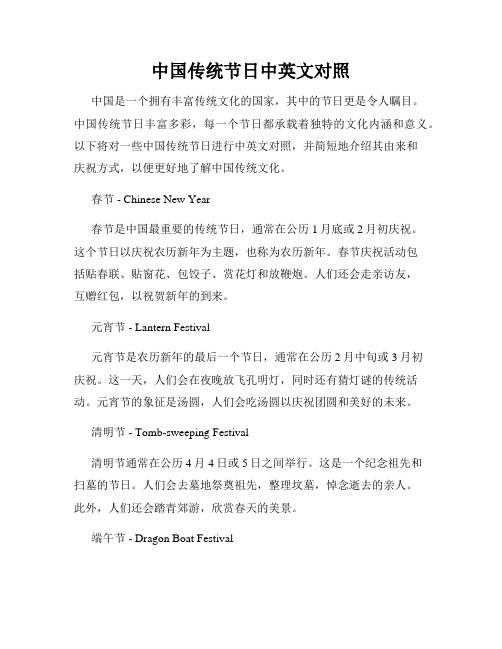
中国传统节日中英文对照中国是一个拥有丰富传统文化的国家,其中的节日更是令人瞩目。
中国传统节日丰富多彩,每一个节日都承载着独特的文化内涵和意义。
以下将对一些中国传统节日进行中英文对照,并简短地介绍其由来和庆祝方式,以便更好地了解中国传统文化。
春节 - Chinese New Year春节是中国最重要的传统节日,通常在公历1月底或2月初庆祝。
这个节日以庆祝农历新年为主题,也称为农历新年。
春节庆祝活动包括贴春联、贴窗花、包饺子、赏花灯和放鞭炮。
人们还会走亲访友,互赠红包,以祝贺新年的到来。
元宵节 - Lantern Festival元宵节是农历新年的最后一个节日,通常在公历2月中旬或3月初庆祝。
这一天,人们会在夜晚放飞孔明灯,同时还有猜灯谜的传统活动。
元宵节的象征是汤圆,人们会吃汤圆以庆祝团圆和美好的未来。
清明节 - Tomb-sweeping Festival清明节通常在公历4月4日或5日之间举行。
这是一个纪念祖先和扫墓的节日。
人们会去墓地祭奠祖先,整理坟墓,悼念逝去的亲人。
此外,人们还会踏青郊游,欣赏春天的美景。
端午节 - Dragon Boat Festival端午节是一个具有悠久历史的节日,通常在公历6月初庆祝。
这个节日源于纪念古代爱国诗人屈原,也是一项庆祝夏天到来的活动。
人们会参加龙舟赛、包粽子和挂艾草。
象征食物是粽子,人们吃粽子以保护自己免受邪恶和疾病的侵袭。
中秋节 - Mid-Autumn Festival中秋节是农历八月十五,通常在公历9月底或10月初庆祝。
这个节日庆祝秋天的丰收和团圆。
人们会赏月、品尝月饼以及举办家庭聚会。
月饼是中秋节的特色食物,馅料的种类多样,寓意着团圆和祝福。
重阳节 - Double Ninth Festival重阳节通常在公历9月初或10月底庆祝,也被称为老人节。
此节日的由来与古代传说有关,人们会爬山、采菊、追溯阳光,并祝福年长的亲人和朋友。
重阳节也是缅怀祖先和尊重老年人的时间。
《中国的传统节日》小学英语作文
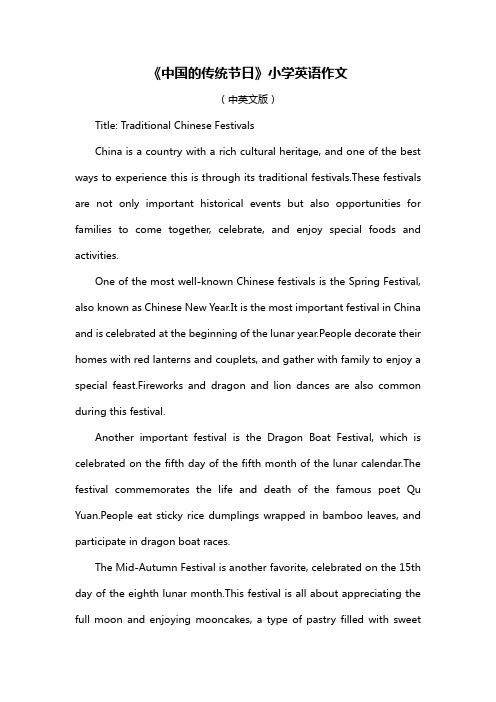
《中国的传统节日》小学英语作文(中英文版)Title: Traditional Chinese FestivalsChina is a country with a rich cultural heritage, and one of the best ways to experience this is through its traditional festivals.These festivals are not only important historical events but also opportunities for families to come together, celebrate, and enjoy special foods and activities.One of the most well-known Chinese festivals is the Spring Festival, also known as Chinese New Year.It is the most important festival in China and is celebrated at the beginning of the lunar year.People decorate their homes with red lanterns and couplets, and gather with family to enjoy a special feast.Fireworks and dragon and lion dances are also common during this festival.Another important festival is the Dragon Boat Festival, which is celebrated on the fifth day of the fifth month of the lunar calendar.The festival commemorates the life and death of the famous poet Qu Yuan.People eat sticky rice dumplings wrapped in bamboo leaves, and participate in dragon boat races.The Mid-Autumn Festival is another favorite, celebrated on the 15th day of the eighth lunar month.This festival is all about appreciating the full moon and enjoying mooncakes, a type of pastry filled with sweetbean or lotus seed paste and sometimes with salted egg yolk.Lastly, the Lantern Festival is celebrated on the 15th day of the first lunar month.People eat sweet glutinous rice balls, known as yuanxiao, and light lanterns to celebrate the festival.These festivals are not only fun and exciting, but they also play a significant role in Chinese culture and history.They bring families together, strengthen community bonds, and provide a chance for people to appreciate the richness of Chinese heritage.。
中国文化中英文对照
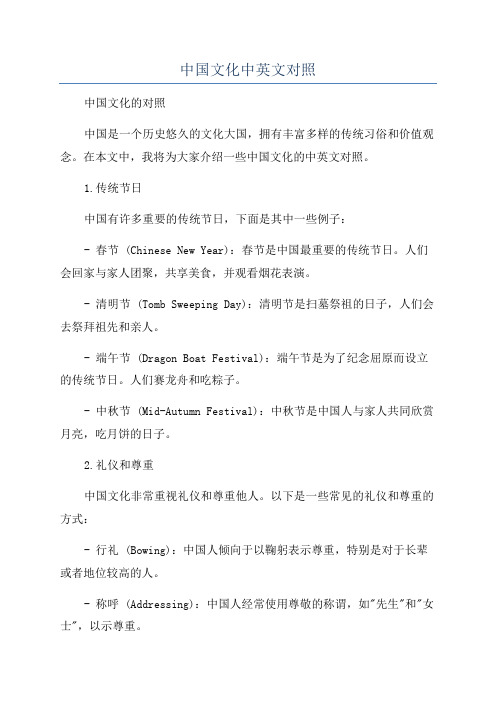
中国文化中英文对照中国文化的对照中国是一个历史悠久的文化大国,拥有丰富多样的传统习俗和价值观念。
在本文中,我将为大家介绍一些中国文化的中英文对照。
1.传统节日中国有许多重要的传统节日,下面是其中一些例子:- 春节 (Chinese New Year):春节是中国最重要的传统节日。
人们会回家与家人团聚,共享美食,并观看烟花表演。
- 清明节 (Tomb Sweeping Day):清明节是扫墓祭祖的日子,人们会去祭拜祖先和亲人。
- 端午节 (Dragon Boat Festival):端午节是为了纪念屈原而设立的传统节日。
人们赛龙舟和吃粽子。
- 中秋节 (Mid-Autumn Festival):中秋节是中国人与家人共同欣赏月亮,吃月饼的日子。
2.礼仪和尊重中国文化非常重视礼仪和尊重他人。
以下是一些常见的礼仪和尊重的方式:- 行礼 (Bowing):中国人倾向于以鞠躬表示尊重,特别是对于长辈或者地位较高的人。
- 称呼 (Addressing):中国人经常使用尊敬的称谓,如"先生"和"女士",以示尊重。
- 饮食礼仪 (Dining Etiquette):在中国,礼仪是饮食文化中不可缺少的一部分。
例如,在用筷子吃饭时,不应该插在饭碗中立起来,因为这会被视为不吉利的行为。
3.文物和建筑中国拥有世界上许多著名的文物和建筑,代表着悠久的历史和独特的文化。
- 长城 (Great Wall):长城是中国最著名的建筑之一,也是世界七大奇迹之一、它是中国古代的防御工事,总长超过21,000公里。
- 故宫 (The Forbidden City):故宫是位于北京的一座宫殿建筑,曾是明清两代24位皇帝的居住地,也是中国历史最长久、规模最大的古代宫殿建筑。
- 兵马俑 (Terracotta Warriors and Horses):兵马俑是位于西安的陶制兵器和马匹的雕像,是中国第一位皇帝秦始皇的陪葬品。
中国传统节日(中英文对照)

中国传统节日(中英文对照简介)目录The Spring Festival(春节)Lantern Festival(元宵节)Qingming Festival(清明节)Dragon Boat Festival(端午节)Double Seventh Festival(七夕)Mid-Autumn Festival(中秋节)Double Ninth Festival(重阳节)Winter Solstice Festival(冬至)The Spring Festival(春节)The first day of the first lunar month is the New Year in the Chinese lunar calendar. Among the traditional Chinese festivals, this is the most important and the most bustling. Since it occurs at the end of winter and the beginning of spring, people also call it the Spring Festival.Chinese have many traditional customs relating to the Spring Festival. Since the 23rd day of the 12th lunar montha, people start to prepare for the event. Every family will undertake thorough cleaning, do their Spring Festival shopping, create paper-cuts for window decoration, put up New Year picturesb, write Spring Festival coupletsc, make New Year cakesd, and also prepare all kinds of food to bid farewell to the old and usher in the new.New Year's Eve is the time for a happy reunion of all family members, when they sit around the table to have a sumptuous New Year's Eve dinner, talking and laughing, until daybreak, which is called "staying up to see the year out". When the bell tolls midnight on New Year's Eve, people eat dumplings. In ancient times, midnight was called zishi (a period of the day from 11 p.m. to 1 a.m.). Dumplings (jiaozi) are eaten because it sounds the same as "change of the year and the day" in Chinese.From the first day of the lunar year, people pay New Year calls on relatives and friends, which is an important custom for the Spring Festival.Setting off firecrackers is the favorite activity of children in the Spring Festival. According to legend, this could drive off evil spirits. The continuous sound of firecrackers can be heard everywhere, adding to the atmosphere of rejoicing and festivity.Many places hold temple fairs. The wonderful dragon lantern dance and the lion dance performances, along with various handicraft articles and local snacks attract thousands of people.With the development of the times, some changes have taken place in the customs of spending the Spring Festival. For example, to prevent environmental pollution, many cities have banned firecrackers. But this does not have an impact on the happy atmosphere of the festival. On New Year's Eve, family members get together to have dinner while watching TV programs.For Chinese at home and abroad, the Spring Festival is always the most important festival.农历的正(zheng)月初一,是中国的农历新年。
中国传统节日(中英对照)
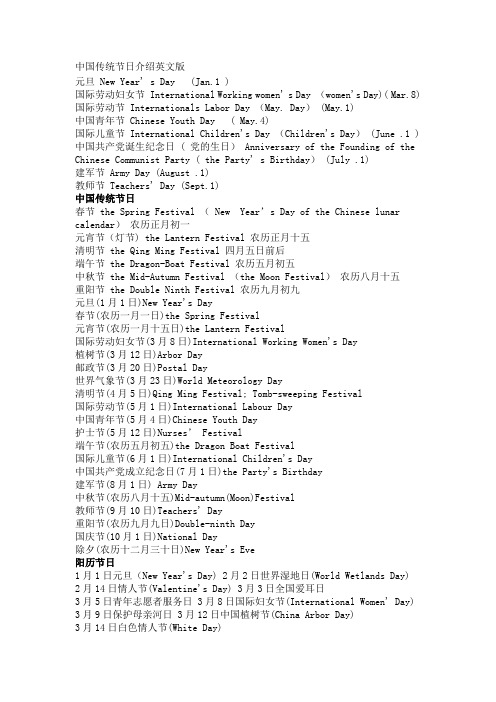
中国传统节日介绍英文版元旦 New Year' s Day (Jan.1 )国际劳动妇女节 International Working women' s Day (women's Day)( Mar.8) 国际劳动节 Internationals Labor Day (May. Day) (May.1)中国青年节 Chinese Youth Day ( May.4)国际儿童节 International Children's Day (Children's Day) (June .1 ) 中国共产党诞生纪念日 ( 党的生日) Anniversary of the Founding of the Chinese Communist Party ( the Party' s Birthday) (July .1)建军节 Army Day (August .1)教师节 Teachers' Day (Sept.1)中国传统节日春节 the Spring Festival ( New Year’s Day of the Chinese lunar calendar)农历正月初一元宵节(灯节) the Lantern Festival 农历正月十五清明节 the Qing Ming Festival 四月五日前后端午节 the Dragon-Boat Festival 农历五月初五中秋节 the Mid-Autumn Festival (the Moon Festival)农历八月十五重阳节 the Double Ninth Festival 农历九月初九元旦(1月1日)New Year's Day春节(农历一月一日)the Spring Festival元宵节(农历一月十五日)the Lantern Festival国际劳动妇女节(3月8日)International Working Women's Day植树节(3月12日)Arbor Day邮政节(3月20日)Postal Day世界气象节(3月23日)World Meteorology Day清明节(4月5日)Qing Ming Festival; Tomb-sweeping Festival国际劳动节(5月1日)International Labour Day中国青年节(5月4日)Chinese Youth Day护士节(5月12日)Nurses’ Festival端午节(农历五月初五)the Dragon Boat Festival国际儿童节(6月1日)International Children's Day中国共产党成立纪念日(7月1日)the Party's Birthday建军节(8月1日) Army Day中秋节(农历八月十五)Mid-autumn(Moon)Festival教师节(9月10日)Teachers' Day重阳节(农历九月九日)Double-ninth Day国庆节(10月1日)National Day除夕(农历十二月三十日)New Year's Eve阳历节日1月1日元旦(New Year's Day) 2月2日世界湿地日(World Wetlands Day)2月14日情人节(Valentine's Day) 3月3日全国爱耳日3月5日青年志愿者服务日 3月8日国际妇女节(International Women' Day) 3月9日保护母亲河日 3月12日中国植树节(China Arbor Day)3月14日白色情人节(White Day)3月14日国际警察日(International Policemen' Day)3月15日世界消费者权益日(World Consumer Right Day)3月21日世界森林日(World Forest Day)3月21日世界睡眠日(World Sleep Day)3月22日世界水日(World Water Day)3月23日世界气象日(World Meteorological Day)3月24日世界防治结核病日(World Tuberculosis Day)4月1日愚人节(April Fools' Day)4月5日清明节(Tomb-sweeping Day)4月7日世界卫生日(World Health Day)4月22日世界地球日(World Earth Day)4月26日世界知识产权日(World Intellectual Property Day)5月1日国际劳动节(International Labor Day)5月3日世界哮喘日(World Asthma Day)5月4日中国青年节(Chinese Youth Day)5月8日世界红十字日(World Red-Cross Day)5月12日国际护士节(International Nurse Day)5月15日国际家庭日(International Family Day)5月17日世界电信日(World Telecommunications Day)5月20日全国学生营养日5月23日国际牛奶日(International Milk Day)5月31日世界无烟日(World No-Smoking Day)6月1日国际儿童节(International Children's Day)6月5日世界环境日(International Environment Day)6月6日全国爱眼日6月17日世界防治荒漠化和干旱日(World Day to combat desertification) 6月23日国际奥林匹克日(International Olympic Day)6月25日全国土地日6月26日国际禁毒日(International Day Against Drug Abuse and Illicit Trafficking)7月1日中国共产党诞生日(Anniversary of the Founding of the Chinese Communist Party)7月1日国际建筑日(International Architecture Day)7月7日中国人民抗日战争纪念日7月11日世界人口日(World Population Day)8月1日中国人民解放军建军节(Army Day)8月12日国际青年节(International Youth Day)9月8日国际扫盲日(International Anti-illiteracy Day)9月10日中国教师节(Teacher's Day)9月16日中国脑健康日9月16日国际臭氧层保护日(International Day for the Preservation of the Ozone Layer)9月20日全国爱牙日9月21日世界停火日(World Cease-fire Day)9月27日世界旅游日(World Tourism Day)10月1日中华人民共和国国庆节(National Day)10月1日国际音乐日(International Music Day)10月1日国际老年人日(International Day of Older Persons)10月4日世界动物日(World Animal Day)10月5日世界教师日(World Teachers' Day)(联合国教科文组织确立)10月8日全国高血压日10月9日世界邮政日(World Post Day)10月10日世界精神卫生日(World Mental Health Day)10月14日世界标准日(World Standards Day)10月15日国际盲人节(International Day of the Blind)10月15日世界农村妇女日(World Rural Women's Day)10月16日世界粮食日(World Food Day)10月17日国际消除贫困日(International Day for the Eradication of Poverty)10月24日联合国日(United Nations Day)10月24日世界发展新闻日(World Development Information Day)10月28日中国男性健康日10月29日国际生物多样性日(International Biodiversity Day)10月31日万圣节(Halloween)11月8日中国记者节11月9日消防宣传日11月14日世界糖尿病日(World Diabetes Day)11月17日国际大学生节11月25日国际消除对妇女的暴力日(International Day For the elimination of Violence against Women)12月1日世界爱滋病日(World AIDS Day)12月3日世界残疾人日(World Disabled Day)12月4日全国法制宣传日12月9日世界足球日(World Football Day)12月25日圣诞节(Christmas Day)12月29日国际生物多样性日(International Biological Diversity Day)1月最后一个星期日国际麻风节3月最后一个完整周的星期一中小学生安全教育日春分月圆后的第一个星期日复活节(Easter Monday)(有可能是3月22-4月25日间的任一天)5月第二个星期日母亲节(Mother's Day)5月第三个星期日全国助残日6月第三个星期日父亲节(Father's Day)9月第三个星期二国际和平日(International Peace Day)9月第三个星期六全国国防教育日9月第四个星期日国际聋人节(International Day of the Deaf)10月的第一个星期一世界住房日(World Habitat Day)10月的第二个星斯一加拿大感恩节(Thanksgiving Day)10月第二个星期三国际减轻自然灾害日(International Day for Natural Disaster Reduction)10月第二个星期四世界爱眼日(World Sight Day)11月最后一个星期四美国感恩节(Thanksgiving Day)农历节日农历正月初一春节(the Spring Festival)农历正月十五元宵节(Lantern Festival)农历五月初五端午节(the Dragon-Boat Festival)农历七月初七乞巧节(中国情人节)(Double-Seventh Day)农历八月十五中秋节(the Mid-Autumn Festival)农历九月初九重阳节(the Double Ninth Festival)农历腊月初八腊八节(the laba Rice Porridge Festival)农历腊月二十四传统扫房日。
中国传统节日及英语

中国传统节日及英语以下是一些中国传统节日的名称及其对应的英语翻译:1.春节(Chūn Jié) - Spring Festival / Chinese New Year:春节是中国最重要的传统节日,也是农历新年的开始,通常在1月21日至2月20日之间。
2.元宵节(Yuán Xiāo Jié) - Lantern Festival:元宵节是春节的最后一天,通常在农历正月十五,庆祝活动包括赏花灯和吃汤圆。
3.清明节(Qīng Míng Jié) - Qingming Festival / Tomb-Sweeping Day:清明节通常在每年的4月4日至4月6日之间,是祭扫祖先墓地的日子。
4.端午节(Duān Wǔ Jié) - Dragon Boat Festival:端午节在农历五月初五,人们赛龙舟、吃粽子,以纪念屈原。
5.中秋节(Zhōng Qiū Jié) - Mid-Autumn Festival / MoonFestival:中秋节在农历八月十五,家人团聚,赏月,吃月饼。
6.重阳节(Chóng Yáng Jié) - Double Ninth Festival:重阳节在农历九月初九,人们爬山、赏菊花,以避灾祈福。
7.冬至(Dōng Zhì) - Winter Solstice Festival:冬至通常在12月21日或22日,人们会吃湖南省特色的汤圆。
8.腊八节(Là Bā Jié) - Laba Festival:腊八节在农历腊月初八,人们吃腊八粥,祈求健康平安。
以上是一些中国传统节日及其英语翻译,这些节日在中国有着悠久的历史和丰富的文化内涵。
- 1、下载文档前请自行甄别文档内容的完整性,平台不提供额外的编辑、内容补充、找答案等附加服务。
- 2、"仅部分预览"的文档,不可在线预览部分如存在完整性等问题,可反馈申请退款(可完整预览的文档不适用该条件!)。
- 3、如文档侵犯您的权益,请联系客服反馈,我们会尽快为您处理(人工客服工作时间:9:00-18:30)。
中国传统节日(中英文对照简介)目录The Spring Festival(春节)Lantern Festival(元宵节)Qingming Festival(清明节)Dragon Boat Festival(端午节)Double Seventh Festival(七夕)Mid-Autumn Festival(中秋节)Double Ninth Festival(重阳节)Winter Solstice Festival(冬至)The Spring Festival(春节)The first day of the first lunar month is the New Year in the Chinese lunar calendar. Among the traditional Chinese festivals, this is the most important and the most bustling. Since it occurs at the end of winter and the beginning of spring, people also call it the Spring Festival.Chinese have many traditional customs relating to the Spring Festival. Since the 23rd day of the 12th lunar montha, people start to prepare for the event. Every family will undertake thorough cleaning, do their Spring Festival shopping, create paper-cuts for window decoration, put up New Year picturesb, write Spring Festival coupletsc, make New Year cakesd, and also prepare all kinds of food to bid farewell to the old and usher in the new.New Year's Eve is the time for a happy reunion of all family members, when they sit around the table to have a sumptuous New Year's Eve dinner, talking and laughing, until daybreak, which is called "staying up to see the year out". When the bell tolls midnight on New Year's Eve, people eat dumplings. In ancient times, midnight was called zishi (a period of the day from 11 p.m. to 1 a.m.). Dumplings (jiaozi) are eaten because it sounds the same as "change of the year and the day" in Chinese.From the first day of the lunar year, people pay New Year calls on relatives and friends, which is an important custom for the Spring Festival.Setting off firecrackers is the favorite activity of children in the Spring Festival. According to legend, this could drive off evil spirits. The continuous sound of firecrackers can be heard everywhere, adding to the atmosphere of rejoicing and festivity.Many places hold temple fairs. The wonderful dragon lantern dance and the lion dance performances, along with various handicraft articles and local snacks attract thousands of people.With the development of the times, some changes have taken place inthe customs of spending the Spring Festival. For example, to prevent environmental pollution, many cities have banned firecrackers. But this does not have an impact on the happy atmosphere of the festival. On New Year's Eve, family members get together to have dinner while watching TV programs.For Chinese at home and abroad, the Spring Festival is always the most important festival.农历的正(zheng)月初一,是中国的农历新年。
在中国的传统节日中,这是一个最重要、最热闹的节日。
因为过农历新年的时候,正是冬末春初,所以人们也把这个节日叫“春节”。
中国人过春节有很多传统习俗。
从腊月二十三起,人们就开始准备过年了。
在这段时间里,家家户户要大扫除,买年货,贴窗花,挂年画,写春联,蒸年糕,做好各种食品,准备辞旧迎新。
春节的前夜叫“除夕”。
除夕之夜,是家人团聚的时候。
一家人围坐在一起,吃一顿丰盛的年夜饭,说说笑笑,直到天亮,这叫守岁。
除夕零点的钟声一响,人们还要吃饺子。
古时候叫零点为“子时”,除夕的子时正是新旧年交替的时候,人们在这时吃饺子,是取“更岁交子”的意思。
这也是“饺子”名称的由来。
过了除夕就是大年初一。
从初一开始,人们要走亲戚、看朋友,互相拜年。
拜年,是春节的重要习俗。
拜年时,大家都要说一些祝愿幸福、健康的吉祥话。
放爆竹是春节期间孩子们最喜欢的活动。
传说燃放爆竹可以驱妖除魔,所以每年从除夕之夜起,到处就响起了接连不断的爆竹声。
阵阵烟花,声声爆竹,给节日增添了喜庆的气氛。
春节期间,很多地方还要举办庙会。
庙会上精彩的舞龙舞狮表演,各式各样的工艺品和地方小吃,吸引千千万万欢度佳节的人们。
随时代的发展,过春节的习俗也有了一些变化。
比如,为防止环境污染,很多城市已禁止燃放烟花爆竹。
但这并不影响节日的热闹气氛。
除夕之夜,家家户户仍然要团聚在一起,一边吃年夜饭,一边看精彩的电视节目,直到大年初一的清晨。
在中国和世界各地华夏子孙的心中,春节永远是最重要的节日。
Lantern Festival(元宵节)The Lantern Festival falls on the 15th day of the 1st lunar month, usually in February or March in the Gregorian calendar. As early as the Western Han Dynasty (206 BC-AD 25), it had become a festival with great significance.This day's important activity is watching lanterns. Throughout the Han Dynasty (206 BC-AD 220), Buddhism flourished in China. One emperor heard that Buddhist monks would watch sarira, or remains from the cremation of Buddha's body, and light lanterns to worship Buddha on the 15th day of the 1st lunar month, so he ordered to light lanterns in the imperial palace and temples to show respect to Buddha on this day. Later, the Buddhist rite developed into a grand festival among common people and its influence expanded from the Central Plains to the whole of China.Till today, the lantern festival is still held each year around the country. Lanterns of various shapes and sizes are hung in the streets, attracting countless visitors. Children will hold self-made or bought lanterns to stroll with on the streets, extremely excited."Guessing lantern riddles"is an essential part of the Festival. Lantern owners write riddles on a piece of paper and post them on the lanterns. If visitors have solutions to the riddles, they can pull the paper out and go to the lantern owners to check their answer. If they are right, they will get a little gift. The activity emerged during people's enjoyment of lanterns in the Song Dynasty (960-1279). As riddle guessing is interesting and full of wisdom, it has become popular among all social strata.People will eat yuanxiao, or rice dumplings, on this day, so it is also called the "Yuanxiao Festival."Yuanxiao also has another name, tangyuan. It is small dumpling balls made of glutinous rice flour with rose petals, sesame, bean paste, jujube paste, walnut meat, dried fruit, sugar and edible oil as filling. T angyuan can be boiled, fried or steamed. It tastes sweet and delicious. What's more, tangyuan in Chinese has a similar pronunciation with "tuanyuan”, meaning reunion. So people eat them to denote union, harmony and happiness for the family.In the daytime of the Festival, performances such as a dragon lantern dance, a lion dance, a land boat dance, a yangge dance, walking on stilts and beating drums while dancing will be staged. On the night, except for magnificent lanterns, fireworks form a beautiful scene. Most families spare some fireworks from the Spring Festival and let them off in the Lantern Festival. Some local governments will even organize a fireworks party. On the night when the first full moon enters the New Year, people become really intoxicated by the imposing fireworks and bright moon in the sky.每年农历的正月十五日,春节刚过,迎来的就是中国的传统节日--元宵节。
